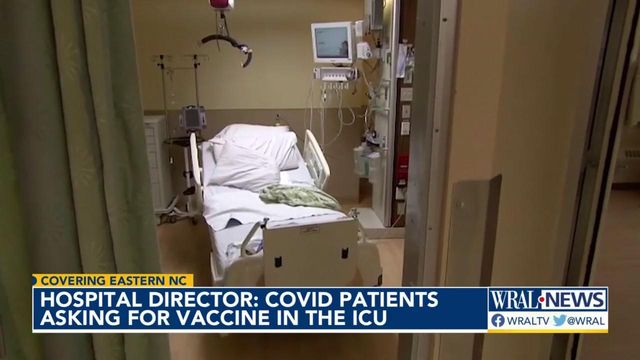'Help us help them.' Zero beds, unvaccinated patients push UNC Health Southeastern beyond its limits
North Carolina is barreling towards the peak number of COVID-19 hospitalizations reached in January, and facilities across the state are feeling the strain. Hospitals, such as UNC Rex, have reached capacity in the Triangle, but beds are already full in other parts of the state as well -- including UNC Health Southeastern.
Posted — UpdatedUNC Southeastern leaders said some coronavirus patients are asking for the vaccine right before being intubated.
"Critical care beds are still full. Our COVID bed unit is still full,” described Joann Anderson, UNC Southeastern's president and CEO.
Across the state, 3,500 people were hospitalized with virus on Thursday. While Triangle hospitals that are running out of beds have set up tents to create more room, hospitals in rural areas seeing COVID-19 surges are left searching for answers.
"I just had a report this morning at 10 o'clock [that] there were no beds available," said Anderson. "The unfortunate thing is, we don't have places to send them to."
In Robeson County, only 29 percent of people are fully vaccinated -- the lowest rate in the state.
Anderson said her hospital is now full because of COVID-19 patients who are unvaccinated. She recently took to Facebook and begged for her community to get the shot.
"That particular day, my executive team and I had been in conversation all day with, how are we going to meet the demand that we're seeing? The ICU beds were full, our COVID unit was full. We had patients that were on the COVID unit that were deteriorating, in terms of their health status, and we were fearful they might need an ICU bed [and] we didn't have one to put them in," recounted Anderson.
In the post, Anderson wrote that she felt like she was failing.
"I was failing as a leader for the organization. I was failing my community. I was failing my team because I couldn't [and] I didn't have the answers," she said.
Anderson said conditions are a constant struggle at the hospital.
"What drove me to put out that message was, I had just reached a limit where I didn't know what else we were going to do," she said. "It felt like I needed to plead to the public to help us help them."
Anderson said she heard a patient code, which means their heart stopped, while on a bed in the hallway waiting for a room on Thursday.
"It really is a situation that's critical from the standpoint of the volume. We just don't have the resources to manage it," said Anderson.
The lack of beds have also caused leaders having to face the prospect of canceling open heart and aneurysm repair surgeries.
"We were in a position where we were thinking about, are we going to have to potentially, and this is a bad word to use, but ration services and decide who gets critical care and who doesn't get critical care?" Anderson said.
Hospital leadership is managing the critical lack of beds hour by hour. Another issue is that with many major hospitals in the state at or near capacity, transfers aren't nearly as possible.
"This is not just a Lumberton or Robeson County issue. This is across the state," said Anderson. "Beds are full everywhere, and the ability to transfer from one hospital to another is very delayed, if there's a bed available at all."
While the access to beds depletes in the hospital, Anderson said health care staff will continue taking care of patients in the emergency room.
"We're going to stabilize them to the best of our abilities in the emergency room. If the bed's not available, we're going to continue to take care of them in the emergency room and look for the closest bed possible. That may take hours. It could take days before a bed becomes available," she said.
Anderson said that, moments before being intubated, some unvaccinated patients in the ICU are asking to get the vaccine.
"Their plea, at that point in time, is, ‘Can I have the vaccine? Can I take the vaccine now?’ And the answer is no. It's too late at that point in time," she said.
The hospital's seen more than 30 virus-related deaths in August alone, according to Anderson.
"It shouldn't be that someone's dying before someone else gets a bed," said Anderson.
The lone bright spot Anderson said is that, in the past few days, her desperate Facebook post appears to be making a difference.
"By me lashing out like I did, it really has started the conversation with a lot of people. If it influenced one or two people to get the vaccine, I'm glad I did it," she said.
For now, Anderson said she's trying to hold on through the next weeks, as health experts expect to see a peak in patient numbers at the end of September.
"This isn't over," said Anderson.
Related Topics
• Credits
Copyright 2024 by Capitol Broadcasting Company. All rights reserved. This material may not be published, broadcast, rewritten or redistributed.






